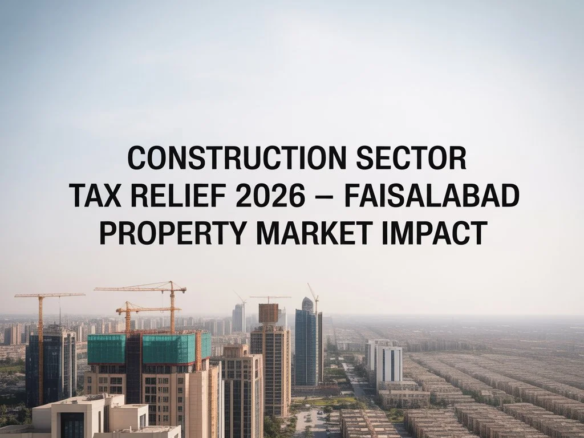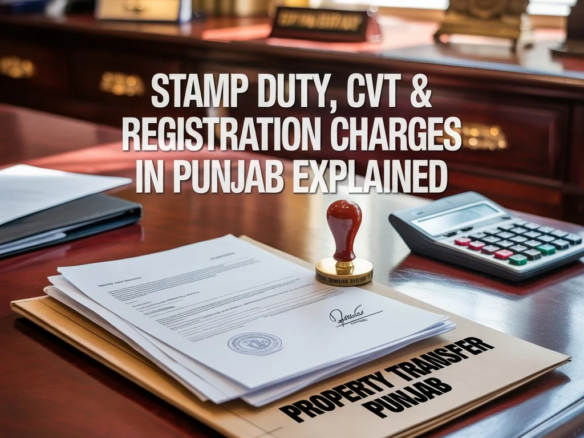Pakistan Budget 2025–26 was unveiled by the federal government of Pakistan with a central focus on reviving economic activity, especially in the real estate and corporate sectors. In a bold and business-friendly move, the budget offers major tax reliefs for property buyers and mid-sized corporations, aiming to accelerate investment, stimulate housing development, and encourage formal economic growth.
With the country still recovering from years of fiscal instability and sluggish growth, these incentives reflect a shift in policy towards private sector-driven revival and economic expansion.
Economic Background and Budget Outlook
Pakistan’s economy has faced a challenging few years marked by rising inflation, low foreign reserves, and IMF imposed fiscal tightening. However, Budget 2025–26 brings cautious optimism. The government targets a GDP growth of 4.2%, a reduction in the fiscal deficit to 4.8%, and a significant push to improve the tax to GDP ratio by broadening the tax base.
The government aims to revitalize key sectors like real estate and corporate investment, which it considers engines of job creation and economic momentum. By offering tax cuts and easing transaction costs, the government hopes to unleash dormant capital, promote documentation, and foster confidence among investors.
Tax Reliefs for the Property Sector
Perhaps the most widely discussed and welcomed aspect of the budget is the set of generous incentives for property buyers and investors. In recent years, Pakistan’s real estate market had been slowing down due to high taxes, procedural hurdles, and a lack of mortgage financing. Budget 2025–26 directly addresses these concerns.
Reduction in Withholding Tax
Withholding Tax (WHT) on property purchases has been slashed across all tiers, significantly reducing the overall cost of property transactions:
- For buyers in the highest slab, WHT is reduced from 4% to 2.5%
- Mid-tier buyers now pay 2% instead of 3.5%
- The lowest bracket has been cut from 3% to 1.5%
This move is expected to revive property transactions, attract overseas investors, and make real estate more accessible to middle-class buyers.
Abolishment of Federal Excise Duty (FED)
A game-changing decision in this budget is the complete abolishment of the Federal Excise Dutyon thetransfer of properties, plots, houses, and commercial units. Previously levied at 7%, this tax had been a significant burden on buyers and developers alike.
Eliminating FED will not only make properties more affordable but also encourage transparent and documented transactions.
Stamp Duty Relief
In Islamabad, the stamp duty on property purchases has been reduced from 4% to 1%, further easing the financial burden on new homeowners and real estate investors. This is particularly beneficial for salaried individuals and first-time buyers looking to enter the housing market.
Encouraging Affordable Housing

To support low and middle-income families, the government has introduced tax credits for smaller properties, specifically:
- Houses up to 10 marlas
- Apartments up to 2,000 square feet
These credits are designed to promote affordable homeownership and are aligned with the broader policy of urban housing development and easing the housing shortage.
Changes for Property Sellers
While the budget largely favors buyers, it also includes revised withholding tax rates for property sellers, aimed at increasing revenue and promoting documentation.
- For property sales up to Rs. 50 million, the seller will now pay 4.5% WHT, up from 3%
- For transactions between Rs. 50 million and Rs. 100 million, the rate is 5%
- For sales exceeding Rs. 100 million, WHT is 5.5%
These changes may discourage speculative trading and large-scale flipping, but they also risk slowing high-value transactions if not paired with broader market reforms.
Crackdown on Non-Filers
To tighten the noose on tax evaders, the government has implemented strict new restrictions on non-filers:
- Non-filers will no longer be allowed to purchase property
- Bank account openings and vehicle purchases will also be restricted for those not on the tax roll
This move aims to expand the tax base and promote financial documentation. While it strengthens tax compliance, critics argue it might create short-term hurdles for informal market participants.
Corporate Sector Tax Relief
In a bid to boost corporate confidence and investment, the budget offers relief on Super Tax for mid-sized companies.
- The Super Tax on corporate income between Rs. 200 million and Rs. 500 million has been reduced by 0.5%
This reduction may seem modest, but it is significant for thousands of companies that fall into this bracket. The extra liquidity will allow firms to reinvest in operations, employment, and expansion.
It also sends a positive signal to investors, indicating that the government recognizes the burdens on businesses and is willing to create a more conducive environment for growth.
Push for Digital Compliance
To support the documentation drive and improve revenue collection, the government plans to:
- Expand digital invoicing and e-filing mechanisms
- Introduce real-time transaction tracking for sectors like cement, fertilizers, textiles, and retail
- Strengthen the capacity of the Federal Board of Revenue (FBR) to detect tax evasion
These steps aim to bring more of the informal economy into the tax net and ensure that future tax reliefs are supported by sustainable revenue growth.
Expected Impact on the Economy
The tax relief measures introduced in Budget 2025–26 are expected to revitalize economic momentum by unlocking investment, encouraging formal transactions, and stimulating consumer confidence. For the real estate sector, reduced transaction costs and the elimination of excise duties will likely lead to a surge in property registrations, enhanced construction activity, and increased demand for housing. This could have a domino effect across allied industries such as cement, steel, and labor markets.
The government expects the corporate sector, particularly mid-sized companies, to benefit from improved cash flow and operational breathing space due to the cut in Super Tax. This move may encourage new business expansions and job creation. Additionally, tax authorities plan to enforce digital compliance systems and offer tax-filing incentives to strengthen revenue collection in the long run, aiming to make the economy more transparent and documented.
However, the success of these measures will rely heavily on effective implementation, investor confidence, and political stability. If the government ensures clarity in regulations and consistency in policy, Budget 2025–26 could become a turning point toward sustainable economic recovery.
Challenges and Concerns
While the budget brings much-needed incentives, it is not without challenges:
- The higher WHT on sellers may discourage large-scale real estate activity
- Restrictions on non-filerscould affect genuine buyers unaware of filing requirements
- Implementation of digital reforms depends heavily on administrative efficiency and infrastructure
There are also concerns about whether the real estate incentives will be accessible to the average citizen or dominated by wealthy investors and developers.
Conclusion
The Pakistan Budget 2025–26 presents a pro-growth, investment-friendly framework, particularly for the real estate and corporate sectors. With tax reliefs, transaction simplifications, and housing incentives, the government has taken a strong step toward stimulating economic recovery.
However, the real test lies ahead in execution, enforcement, and balancing incentives with sustainable fiscal responsibility. If managed well, this budget could mark a turning point for Pakistan’s economy, laying the foundation for avibrant, documented, and inclusive financial ecosystem.
Want to know more? Check out Pakistan’s Real Estate Market Trends & Investment Guide for 2025
Like, share and comment: Facebook, Istagram, Youtube and Tiktok





Join The Discussion